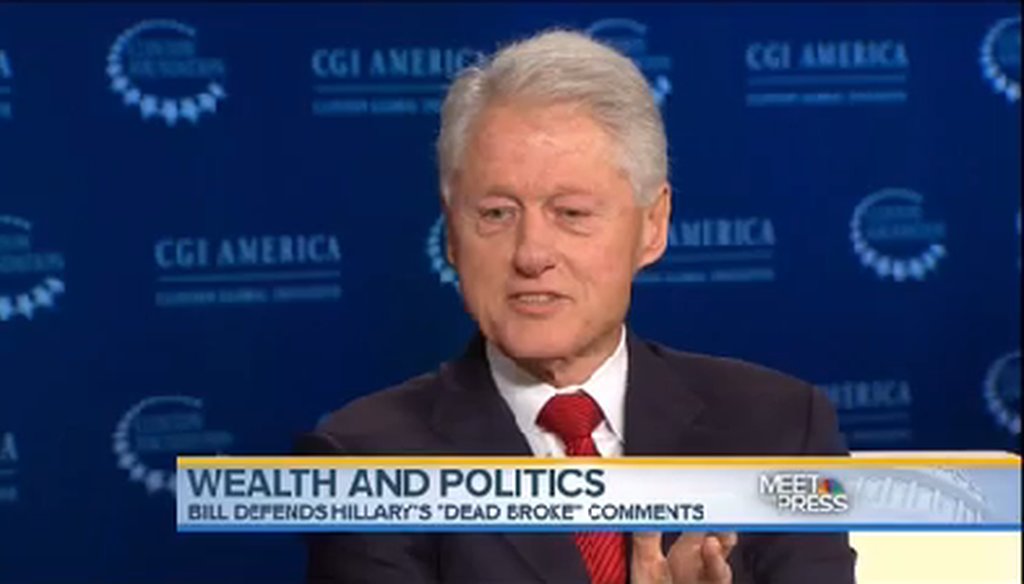Stand up for the facts!
Our only agenda is to publish the truth so you can be an informed participant in democracy.
We need your help.
I would like to contribute

Bill Clinton said, "I had the lowest net worth of any American president in the 20th century when I took office."
Bill Clinton still wanted to talk about his family’s wealth in a taped interview Sunday on NBC’s Meet the Press, defending Hillary Clinton for saying the two were "dead broke" after leaving the White House.
Speaking with NBC host David Gregory from Denver, Clinton said that is was "factually true" that his family was several million dollars in debt when they left the White House. (The public record doesn’t prove that conclusively.)
The former president also said that the Clintons, who are now worth tens of millions of dollars, came into the White House without significant wealth.
"I had the lowest net worth of any American president in the 20th century when I took office," Clinton told Gregory, with his wife and daughter Chelsea looking on from the audience.
PunditFact wanted to see if Clinton had this particular aspect of presidential history correct.
Sign up for PolitiFact texts
Clinton never really earned much money as a career politician in Arkansas. As governor, he made $35,000 a year. HIllary Clinton was in many ways the family’s breadwinner as a lawyer and senior partner in the Rose Law Firm of Little Rock. By 1992, the Clintons listed their net worth as nearly $700,000 with their biggest assets being a $387,000 investment portfolio and $180,000 in retirement plans.
Where the Clintons’ wealth compares to the other presidents of the 20th century, starting with William McKinley, is a nearly impossible feat, experts told us. Problems include a lack of uniform candidate financial disclosure requirements, inflation and changing national circumstances.
"It’s one of those Clintonesque statements that can be true but who knows?" said Lewis Gould, a visiting distinguished professor at Monmouth College and scholar of William McKinley.
Often, people discussing the least monied presidents -- especially in the 20th century -- turn to Harry S. Truman.
Truman’s money problems and bankruptcy-dodging as a result of his failed haberdashery business in the 1920s are no secret. With debts over his head, he continued to climb political ladders, first as a county judge and ultimately as U.S. senator, vice president and president upon Franklin D. Roosevelt’s death in 1945.
Truman continued to live modestly as a senator and vice president, residing in a modest two-bedroom apartment in Washington, D.C., shared with his wife Bess, daughter Margaret and ailing mother-in-law. Truman’s mother-in-law, not Truman, owned the well-known Truman Home in Independence, Mo., said Alonzo Hamby, a Truman biographer and distinguished professor of history emeritus at Ohio University. Even as a U.S. senator in 1935 earning $10,000, Truman was not in a solid enough financial position to save the family farm owned by his mother, Hamby said. So even though it’s not clear what his net worth was before he became president, Hamby said, "I find it very hard to believe that Bill Clinton was in a tighter financial situation."
Other contenders include McKinley, who lost much of his wealth in the economic collapse of 1893, and Gerald Ford, who reported a net worth of $257,000 in 1973 ($810,000 in 1992 dollars).
In this case, there’s not enough evidence to prove Clinton correct, but he is at least right in his larger point: He did not enter the White House with the wealth of many of his contemporaries.
So we rate his claim Half True.
Another hot topic Sunday: The unanimous Supreme Court ruling striking down three Obama appointments to the National Relations Board. The ruling was significant because the court ruled Obama overstepped his constitutional powers by making the appointments without Senate confirmation.
It’s familiar script with Obama, Republicans such as Rep. Bob Goodlatte claimed.
Speaking on Fox News Sunday, Goodlatte said Obama has a track record of going too far only to be slapped back by the Supreme Court -- including his own appointees.
"The 9-0 decision last week was the 13th time the Supreme Court voted 9-0 that the president had exceeded his constitutional authority," Goodlatte said.
Goodlatte’s assertion rates False.
Susan Bloch, a constitutional law professor at Georgetown University, said the NLRB case is very different than the rest of the cases on the list Goodlatte provided, in that the court actually was ruling on a separations of power issue and a presidential overreach.
"That’s a fair case of the president’s use of executive authority getting rejected," she said.
But the rest of the claim? "It’s a total overstatement," Bloch said.
Why?
For starters, in eight of the cases, the alleged overreach occurred under President George W. Bush, as did the court cases that challenged the administration (United States vs. Jones, Sackett vs. EPA, Hosanna-Tabor Evangelical Lutheran Church & School vs. EEOC, Gabelli vs. SEC, Arkansas Fish & Game Commission v. United States, PPL Corp. vs. Commissioner of Internal Revenue, Horne vs. USDA, and Bond vs. United States). Bush’s Justice Department handled the initial court proceedings in most instances.
Another case on the Goodlatte’s list and decided last week, McCullen vs. Coakley, dealt with state laws, particular whether a Massachusetts law that put no-protest zones around abortion clinics, was constitutional. While the Obama administration filed a brief supporting the Massachusetts law, the issue decided had little to do with executive authority.
"This is a concocted statistic," said Tom Goldstein, publisher of the Supreme Court blog SCOTUSblog.com. "It's just saying that the government lost cases unanimously. The government participates in roughly 60 cases a term. Every administration loses cases unanimously."
Katie Sanders and Steve Contorno Contributed to this report. Aaron Sharockman is the editor of PunditFact.com.
Our Sources
See individual fact-checks.




































